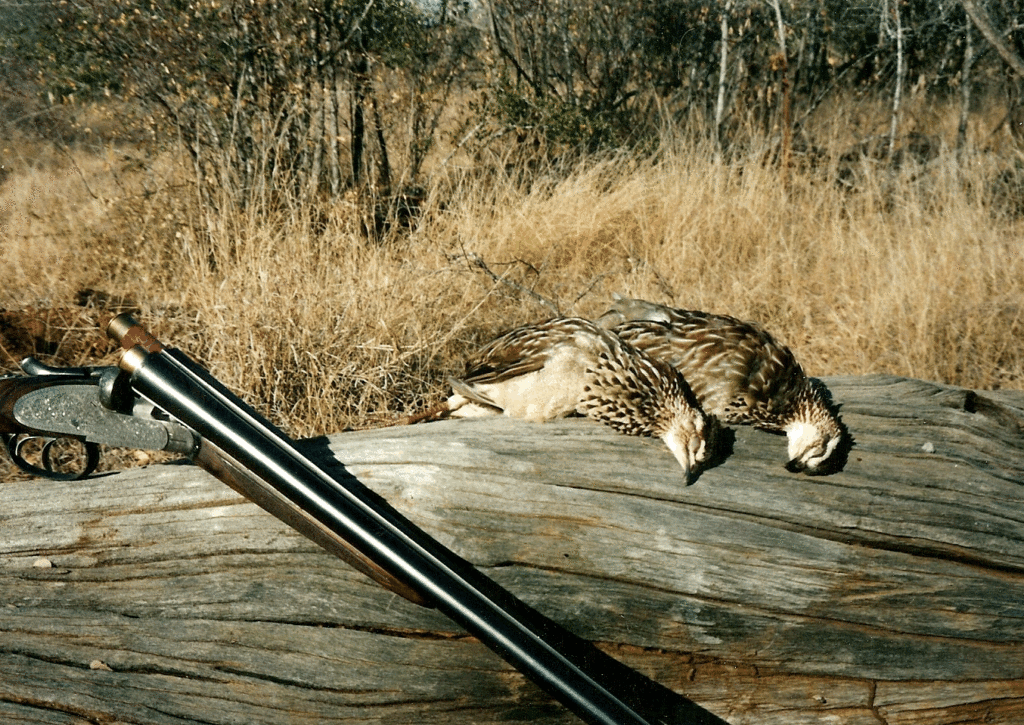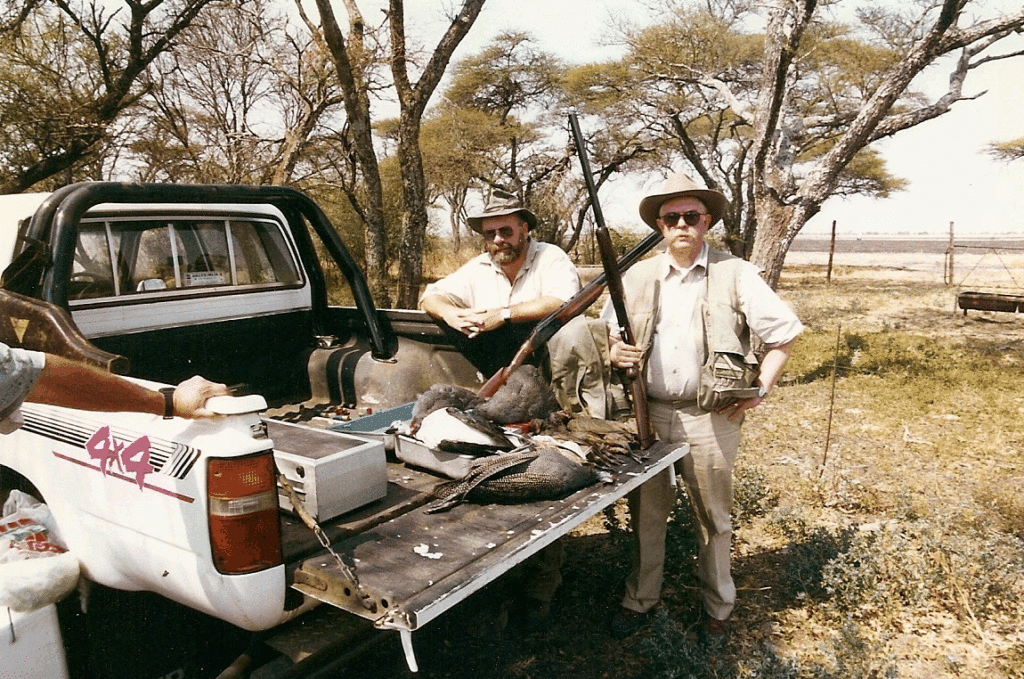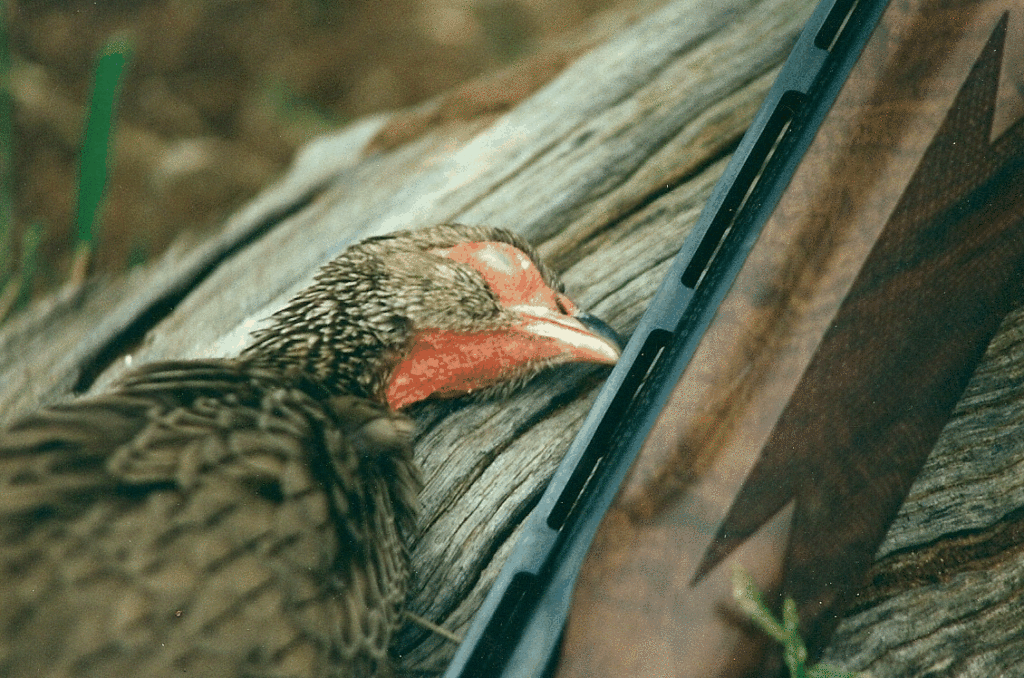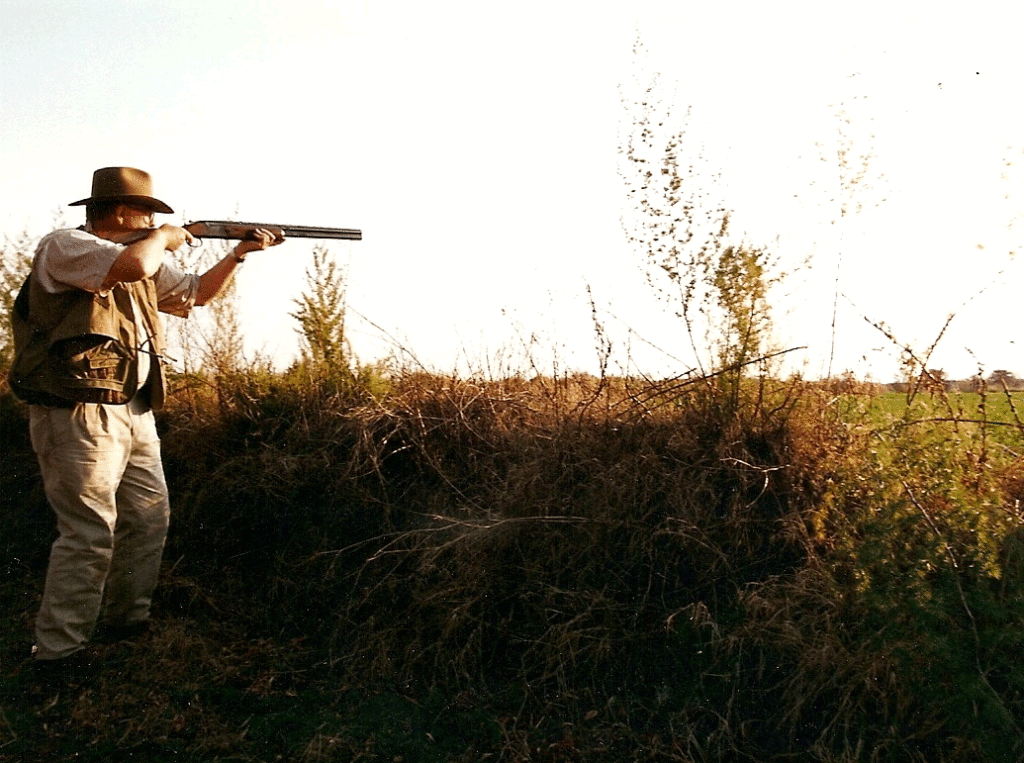The farmer went by the name “Boats.” I never learned his family name and his Christian name kept me baffled, but that wasn’t important.
What was important to me was getting to the farming community of Kopjes and then on to the bird hunting in the farmland of the South African countryside south of Johannesburg. My hunting partner on the South African bird hunting safari was Lynn “Doc” Greenlee and our trip was organized by Chris Styen (then) manager of Rocco Gioia’s Landela Lodge on his Casketts Ranch, where our safari began and would end after another five days of bird hunting.
Chris had booked Boats and his farm for a full day of bird hunting and the primary species was going to be guinea fowl, which, for me, was both good and bad. Good, because there would be ample opportunity to hunt the large birds and bad because I was on a losing streak when it came to killing one of the big birds. In the first few days of our two week safari I had failed to hit a single guinea fowl although I’d bagged my share of all the other game birds that we’d hunted. I knew the reason I was missing the big birds—I was underestimating both the speed and distance. Later I learned my mistakes are actually fairly common among Americans hunting African birds. The problem had been hammered home to me the day before when we were hunting the lands around the newly opened Sondela Lodge. At the time the lodge had been gaining a reputation for the variety of bird hunting opportunities but since then it has morphed into a nature reserve and no longer offers hunting, which is a loss for sportsmen and sportswomen. On the other hand, another operation, by the same name, Sondela Adventures, (www.sondelaadventures.com/home.html), is offering tailor-made bird hunting in the same region of South Africa.
Joyce Viljoen, who was then the manager of the lodge, had arranged for a local PH, Rob James, to serve as our guide. The evening before Rob arrived Joyce assured us that we would have a good hunt, not just because of abundant game bird population but because Rob was an excellent guide, hunter, and had a brace of well-trained hunting dogs.
“Every year a few more international hunters return to hunt with Rob because he is so good at what he does,” she said.
In the mid-1990s bird hunting in Africa, for many hunters, was still a sideline event to big game hunting. At the time few American hunters were actually booking bird hunting safaris, but since then growing numbers of American and European hunters have discovered Southern Africa’s wealth of birds. Ironically, both Robert Ruark and Peter Capstick, both icons of American outdoor writing, had covered bird hunting in their books.
For Doc and me our bird hunting safari was the culmination of a year of discussion and planning that began on an earlier hunt on Casketts Ranch.
The First Miss and Spooked
The plans for our hunt were simple; we wanted to visit different parts of RSA, never spending more than a few hours on the road between hunts. We wanted to hunt as many species of game birds as possible in ten days of actual hunting. We started our hunting on a small farm near Johannesburg, roamed southward and then back toward Landela Lodge, Rocco Gioia’s well-known game ranch bordering Kruger Park, and then we returned to Johannesburg and turned north. The Sondela hunt was the northern phase of the trip and was the midpoint of our hunt. The problem was that on the first day of our hunt I’d blown an easy shot a guinea fowl that flushed about ten yards in front of me. It was a classic rising pheasant shot in the states, one that every bird hunter is expected to make with ease. I missed. Ten minutes later I missed again, this time a crossing, left to right, shot. Between those misses, I’d put two francolins in my game bag. But the guinea fowl had spooked me.
That is the problem with missing a bird that should have been an easy hit—you can spook yourself. One of the stories in my collection of short stories about Americans in South Africa (Last Supper in Paradise) is simply titled “Dennis” and it is the story of a hunter who becomes spooked when he is unable to hit a game animal. The big game aspect of the story is loosely based upon a real incident that took place on Rocco’s Casketts Ranch but the meat of the story is taken from my failure to kill a specific game bird—the guinea fowl. By the end of the first day of hunting, with Doc having put several guinea fowl in the game bag and I having missed twice as many, I was frustrated and angry with myself. After all, I was an avid bird hunter and I remain so today and missing a bird that size just wasn’t acceptable in my hunting experience. The problem was that no matter how hard I tried and how much I forced myself to calm down the guinea fowl were all escaping my shots while Doc was knocking them down. I was badly spooked and I knew it.

Sondela Morning
The morning of our Sondela hunt Rob was knocking on our chalet door before dawn. Our plan was to meet him, have breakfast in the chalet and then go hunting. We hadn’t planned on dragging our sorry butts out of bed before dawn.
“Hasn’t anyone told you that bird hunting is a gentlemanly thing,” Doc said as he stumbled out of his bedroom.
“I’ve heard that but the birds haven’t,” James answered.
“Then tell them,” Doc quipped.
I felt like rolling over and going back to sleep. I knew what was coming, more misses. I was cursed. Instead, I pushed myself out of bed. I had a slight headache from too many sundowners and I went into the kitchen for coffee. Chris was up, cooking and disgustedly cheerful. I walked past him and told him to take a short cut to the theological place of eternal punishment, which he, of course, refused.
Breakfast downed and the sound of dogs outside was enough to get us moving and in short order, we were piled into Rob’s pickup with the dogs and guns and we were off for the birds. The first stop was a field where Rob assured us we would get into at least two species of francolin and probably some guinea fowl. Of course, he was right and a few minutes after starting our walk behind the coursing dogs one dog locked onto a perfect point with the other dog backing.
“Francolin,” Rob said, “tell by the way she’s pointing. Doc, she’s on your gun side, you take the bird.”
Doc did as he was told and walked toward the frozen pointer, calmly talking to the dog as he walked. He was only a few yards away when three birds exploded from the bush and Doc calmly dropped two—a feat that pleased Rob.
The next birds were mine and I managed to drop one of two that flushed and then Chris took a turn, using his fine Spanish double to drop one bird out of a pair. The morning didn’t slow down and we were usually alternating our shooting although a few birds flushed directly in front of us as we walked, having been missed by the dogs. By mid-morning, our bag of birds was bulging when Rob stopped us and signaled for us to join up on him.
“Guinea fowl,” he whispered when we were close. He directed us to take up different positions, about ten yards apart, and to walk toward the birds. He’d called the dogs back and clipped them to leads. At first, I thought he was nuts but when Chris had two birds flush from practically under his feet I started paying attention to the clumps of grass and small islands of thorn thickets in the dry grass. My first chance came with a single that exploded from under my foot and I thought I had it nailed when I saw feathers fly from its tail. When the bird kept on going Rob walked over to me, laughing and holding the dogs. “You just met the armor plating of the guinea fowl,” he said. “Sometimes you can clean all but the feathers from their wings and they keep going. Strange birds, they are.”
I mumbled and picked up my two empties.

Doc made a shot that was the most remarkable of the day. Two birds had let us walk right past them, flushing only when Rob and the dogs got too close. They climbed nearly straight up and then flew on a level flight path over Doc’s head; a high path that Doc said was out of range.
“Shoot,” Rob shouted, “they’re in your range.”
Doc shot at one bird, unloading both barrels of his Beretta on the same bird. It wobbled but kept on flying.
“Missed,” Doc said.
“No you didn’t, Doc,” Rob said. “Just watch the bird.”
We did as we were told. The bird was flying unimpaired when it suddenly folded its wings and dropped straight to the ground, falling out of the sky like ripe fruit. “I’ve seen it many times when hunting these birds. High flying bird takes a single pellet through the heart, flies on for twenty, fifty yards because it doesn’t know it’s dead, and then it just stops flying.”
We ate lunch in the field, brought to us by Joyce, and after a short rest, we returned to the hunt. Rob tried everything he could think of to get me a guinea fowl, and it was all to no avail. I missed a full box of shots at guinea fowl and by the end of the day, when we said goodbye to Rob and Joyce, to head for our next hunt, my general feeling was that I was losing my touch as a shotgunner.
Hunting with Boats
When we met Boats, at his farmhouse, we spent a little time talking about the pleasantries of life then got right to the point. We were there to go bird hunting. Chris and Boats planned the day’s hunt and the morning was to be spent walking along the river bottom, with Boats on the high banks above us. He didn’t have dogs so he would spook the birds to us so we would have the opportunities for pass shots at whatever he flushed. It worked very well. Doc and I both killed francolins and Doc killed a guinea fowl that Boats flushed over us. I didn’t take a shot at one of my curse birds.
After we’d walked the planned distance along the river we waited for Boats to work his way down from the high banks. We’d been unable to retrieve two of the birds we killed—Doc’s guinea fowl and a francolin. We returned to where the birds had fallen then watched Boats find a route across the river, pick up the guinea fowl and bring it back. We then went to where the francolin had fallen into the water. Boats looked at the bird, floating ten feet away. After thinking about it he figured out how to retrieve the bird by using a long stick. After dropping the soggy bird in Doc’s outstretched hands he said something in Afrikaans and Doc looked at Chris for a translation.
“He said he either has to get a dog or stop taking Americans hunting.”
The Great Guinea Fowl Flush
The mid-morning break turned into a long mid-morning dove shoot. Boats drove us to an intersection of several planted fields and after we’d drunk some coffee, eaten rusks and rested up Doc and I decided to take a few shots at dove. The few shots turned into the rest of the morning. The birds were flying from every direction, and of several species. When Boats asked us if we wanted to hunt more francolin we told him that we’d rather stay in one place and shoot at dove until lunch. We did. We lost track of the number of dove we killed and while we shot at birds Boats and Chris built a fire and prepared sausages for lunch. Boats’ mother brought out a hot guinea fowl pie and cold beer for us.
“You know what will make this even better?” I asked after lunch.
“What?” Doc said.
“Me breaking my curse and killing a guinea fowl.”
Neither Doc nor Chris answered.
We rested for another half hour before Boats asked us if we were ready for a most unusual experience. Of course, we were but what he proposed was startling. He explained that the guinea fowl flocks were in fields on the far side of his farm; about a mile from where he wanted to station us behind a line of thorn brush. He planned to walk around the flocks, get behind them and then, as he explained it, “attack the birds and send them flying toward you. You’ll get lots of shooting.”
We were game for it and after picking up all the chairs, boxes of empties and bags of dove we started for the next phase of the hunt. Boats directed us to a series of thorn brush islands in the grass. He gave explicit instructions not to shoot at the first forty or fifty birds. “You’ll frighten the other others and they will land. If you let some get past you then the others will keep flying, even after they see you because they will follow the other birds.”
It sounded okay to us. Chris, Doc and I got in position and waited. The afternoon seemed to be getting hotter but finally, Chris shouted that he could see Boats. I looked with my binoculars and sure enough, there was a mad man charging what was becoming a rising cloud of guinea fowl. Some people say the birds will gather into flocks of a couple of hundred birds, this was a series of flocks of several hundred birds in each flock. As Boats ran toward the birds he was waving his shirt and arms and jumping up and down like a mad man who just escaped the cuckoo nest. It was also working. The birds were in the air and headed our direction, away from the nut case attacking them.
“Here they come,” I shouted and then put the binoculars away.
“Remember, let the first group past,” Chris said.
No one answered; we just nodded and crouched behind the brush. We could hear the wings even before the birds passed overhead, and then the sky seemed full of birds. I kept reminding myself to pick out one bird and concentrate on it. I looked toward Boats, there were hundreds of birds still flying our way and we’d let at least a hundred past without firing a shot.

“Let’s shoot,” Doc shouted as he stood up and began tracking his first bird. I watched him bring his gun up, follow the bird and then shoot, the shot connecting and the bird tumbling to the ground.
There was no doubt about that shot and he was already on another bird. I looked up, picked out a bird and locked onto it like a heat-seeking missile. I followed through and fired and I saw the bird rock. I’d hit it but I didn’t want a heart shot! I tracked it for the second shot and fired and the bird folded its wings.
It was, I realized, anti-climatic. I’d just broken the curse and it seemed too easy.
I marked where the bird fell, reloaded and shot at another bird, missing it cleanly but the panic was gone and I reloaded. By this time the birds were starting to thin out but I picked a single bird out, tracked it and again locked onto the bird and brought it down. A few minutes later Boats walked up to us. He was breathing hard and grinning. “
Got some birds that time didn’t we!” he said.
All of us were smiling. We had each killed at least two birds.
“And you,” he said, pointing to me, “you can kill a guinea fowl.”
There was little else to say. We walked to the Land Cruiser and while Chris drove, Doc and I rode in the back, standing up and holding on to our shotguns.
Occasionally Chris would stop and we’d run a hundred yards one direction or the other to get under some flying guinea fowl for some fast pass shooting.
Today I don’t even remember if I hit a bird on the evening shooting because my mind focused then, and focuses now, on the bird that broke my curse.
That and what Doc said as we rode in the back of the truck toward Boats’ farmhouse.
“This has been another good day in Africa.”
“Yeah, it has been Doc, a damned good day in Africa,” I said.
| Galen L. Geer is a former United States Marine Drill Instructor and Vietnam veteran. A professional outdoor hunting, shooting and gun writer, he published 2000 magazine articles. He has been a contributing editor to Soldier of Fortune magazine for thirty years and is the author of seven books. |

